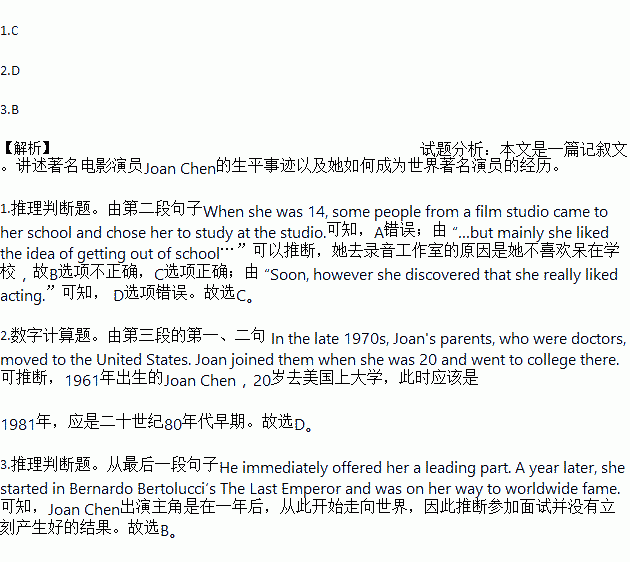题目内容
Joan Chen is famous both in China, where she grew up, and in the United States,where she now lives. How did Joan become a famous actress in two countries? It’s an interesting story.
Joan Chen was born in Shanghai in 1961. When she was 14, some people from a film studio (制片厂) came to her school and chose her to study at the studio. She was happy about this chance, but mainly she liked the idea of getting out of school. Soon, however she discovered that she really liked acting. At age 18, she won the Golden Rooster, China's top film prize.
In the late 1970s, Joan's parents, who were doctors, moved to the United States. Joan joined them when she was 20 and went to college there. Her parents hoped she would study medicine. Instead, she majored in(主修) film and later looked for work as an actress. To work in the United States, Joan had to start all over again. She told Hollywood that she was an actress in China, but she only got some small parts in TV shows.
One day Joan went to speak to a director who was making a movie called Tai --pan. The interview didn't go well. As she walked away, a man in a car noticed her. The man was Dino De Laurntiis, the film’s producer(制造者). He immediately offered her a leading(主要的) part. A year later, she started in Bernardo Bertolucci’s The Last Emperor and was on her way to worldwide fame.
1.What was turn about Joan Chen when she was 14?
A. Some people came to her school and chose her as an actress.
B. She liked to study at the studio just because she wanted to be famous.
C. The most important reason for her going to the studio was that she wouldn't like to stay at school.
D. She found she was fond of acting even before she was 14.
2.When did she move to the States?
A. In the late 1970s. B. After she graduated from college.
C. In the late 1980s. D. In the early 1980s
3.The interview with a director ____.
A. made her on the way to being famous in the world
B. led to no immediate good result
C. made her play a leading part in Tai-- pan
D. gave her a chance to act in The Last Emperor
根据下列表格中的内容,写一则旅行日记
时间 | 9月5日,星期六,天气晴朗 |
地点 | 天涯海角 (Ultima Thule) |
抵达方式 | 乘校车 |
出发时间 | 上午7点20分 |
到达时间 | 上午9点半 |
活动内容 | 上午:在沙滩上做游戏,去游泳,在饭店吃午饭 下午:用英语讲故事比赛,颁奖,照相 |
返回时间 | 下午5点半 |
注意:1. 表格中所列内容不得遗漏,要意思连贯,表达清楚。
2. 不要逐条翻译,可适当增加细节,以使行文连贯。
3. 词数:100词左右 比赛hold a contest, 奖品prize
____________________________________________________________________________________________
____________________________________________________________________________________________
____________________________________________________________________________________________
____________________________________________________________________________________________
____________________________________________________________________________________________
____________________________________________________________________________________________
____________________________________________________________________________________________
________________________________________________________________

